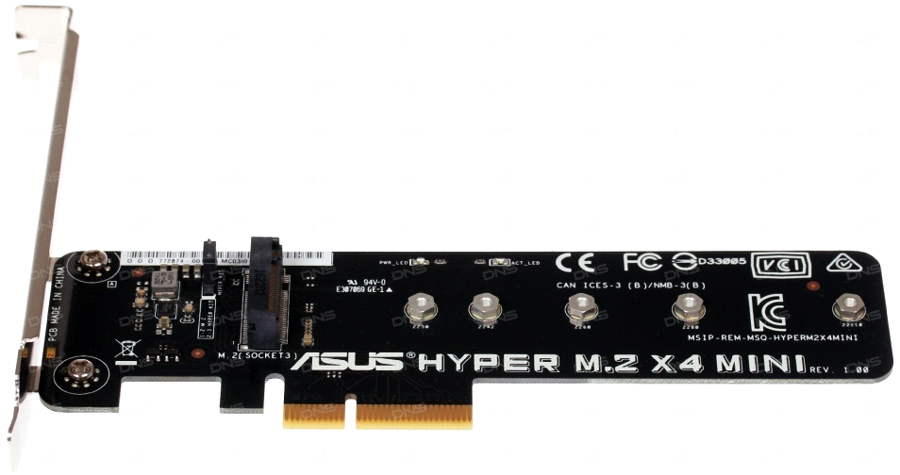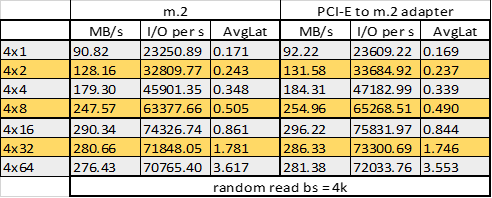Overview
The ASUS HYPER M.2 X4 MINI adapter is a device intended for SSD drives that use the popular M.2 format, but which are installed on motherboards lacking an M.2 slot. The adapter allows for the use of SSD drives in existing configurations with motherboards with a PCI-E slot, without requiring the purchase of new equipment.

The ASUS HYPER M.2 X4 MINI model is a low-profile expansion board, which includes support for a PCI-E x4 interface without restrictions regarding the interface version. The X4 labelling indicates support for 4 lines of the PCI-E interface, which ensures maximum performance of data transfer via the adapter. The adapter, which is solely compatible with M.2 SSD models that support PCI-E, is intended for internal installation and does not have external ports. The construction of the adapter allows for installing M.2 drives of various sizes: from 2242 to 22110 (which corresponds to the sizes 22×42 and 22×110, respectively), which ensures additional flexibility when planning hardware configurations for existing processes.
Tests
The ASUS HYPER M.2 X4 MINI adapter demonstrates excellent performance in read and write modes, both with fixed load patterns and in a mode involving a fixed number of threads with various queue depths. The adapter supports sequential reading at 597.46 MB/s (IOPS 152948.71), with an average latency 0.418 s, for a 4k block, and 1246.83 MB/s (IOPS 19949.22), with an average latency 3.208 s, for a 64k block. Sequential writing speed is 198.58 MB/s and 140.01 MB/s for a 4k and 64 block, respectively, with an average latency for transferring data at maximum loads of no more than 28.5 s (minimum value is 1.258 s).
Random reading and writing speeds are 388.43 MB/s and 131.25 MB/s, respectively, for a 4k block and 1151.58 MB/s and 138.54 MB/s, respectively for a 64k block, with an average latency in the range of 0.643 s to 1.904 s for a 4k block and 3.473 s to 28.868 s for a 64k block (number of threads and queue depth is 4×16).

Table 1. A standard reading and writing performance test with a fixed load pattern (number of threads and queue depth is 4×16).
In a random read mode of a 4k block with a fixed number of threads (4) and varying queue depth (1 to 64), the adapter supports speeds from 92.22 MB/s (IOPS 23609.22), with an average latency of 0.169 s (queue depth 1), to 281.38 MB/s (IOPS 72033.76), with an average latency 3.553 s (queue depth 64). Data-transfers from the 512GB SSD drive may therefore only 30 min, which that significantly expands possibilities for systems, through which the transfer of significant amounts of data are required.

Table 2. Random reading test for a 4k block with a fixed number of threads and varying queue depth (1 to 64).
Conclusions
Performance results obtained during comparison tests in various read and write modes demonstrate that the ASUS HYPER M.2 X4 MINI model can be successfully used in existing hardware configurations when it is necessary to increase the overall performance and speed of reading and writing data by means of SSD drives without costly hardware upgrades, which implies purchase of new motherboards that include an M.2 slot.
This significantly increases flexibility when a configuration is selected, as the ASUS HYPER M.2 X4 MINI adapter has an ideal price/performance ratio and helps to greatly reduce the system’s total cost of ownership.
Further, support for 4 lines of the PCI-E interface without any restrictions on the interface version (due to a simple hardware configuration, without additional controllers and with a simple power converter) and various M.2 SSD drive-sizes greatly increases application and subsequent upgrade options using previous-generation data media.
Related materials:

Views All Time
3

Views Today
5
The following two tabs change content below.
Filed under:
Hardware, Test by Vladimir Yamkovoy